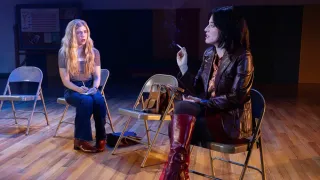October 21, 2022
Review: 'My Policeman' an Understated, Passionate Affair
Kilian Melloy READ TIME: 3 MIN.
Michael Grandage's understated, engrossing film adaptation of Bethan Roberts' 2012 novel "My Policeman" dwells in the long shadow of youthful mistakes – quite literally. Set in two periods, 1957 and 1994, the film douses youthful optimism in a shroud of later-life regret that takes the form of close confines, low-lit environments, and a background murmur of ocean waves.
Tom (Linus Roach) and Marion (Gina McKee) have retired to the seaside village of Peacehaven. Their marriage – a quiet, passionless one – is rocked when Marion brings an old friend, Patrick (Rupert Everett), into their home. Patrick has suffered a stroke, and Marion can't stand the idea of letting him end up in some drab, impersonal facility. It's a magnanimous gesture, and Tom is unhappy with it. The reasons for Marion's generosity and Tom's displeasure become clear as Patrick's presence sparks recollections of a time, 40 years earlier, when the three had been close friends... and as Patrick's diaries, read by Marion, fill in and explain certain things that Marion may only have suspected.
As young people at the beginning of their careers in the late 1950s, the three had everything to look forward to – almost. Marion (played as a younger woman by Emma Corrin), a schoolteacher, finds herself being courted one sunny July day by Tom (Harry Styles), a London policeman. An early point of connection for the two is Tom's interest in self-improvement. He asks Marion's advice on what books to read, and his friend Patrick (David Dawson), already a director at a museum, soon takes both of them under his wing to tutor them in the appreciation of art and music.
At first Marion accepts Patrick's attention as those of a lonely academic, while Tom suggests that Patrick is attracted to Marion. What soon becomes clear, though, is that the strongest attraction is between the two men – a situation that Marion frets over, confiding to a colleague at work that she fears Tom has "inclinations" Patrick "encourages." Only decades later, reading Patrick's diaries, will she come to realize that Patrick was not a threat to her marriage to Tom. Rather, she was the interloper on their already-existing relationship, and Tom was using her as a way of blending in with his fellow officers.
Movies about gay men romancing straight women for their own convenience frequently dwell on the pain this causes to the women in question, and this film looks at that, too. But the film also shows us the cost that such lies exact on the men. Tom's position is a difficult one; he's an officer of the law at a time when it's illegal to be gay. Indeed, there's a hint of workplace sexual harassment, of a sort, when Tom tells Patrick about his sergeant warning him that "bachelors" don't thrive in their law enforcement careers. .
Patrick, too, faces an insoluble paradox in loving a policeman, when it's the police he has to fear in any situation that could be construed as sexual between himself and another man.
The situation is untenable, and Patrick signals a presentiment that things can only go wrong when, while sharing a drink with Tom and Marion, he declares that "all love stories are tragic" – a line that reverberates strongly when the older Tom, decades later, glimpses a male couple at the local market and finds himself overcome by the pain and loss of a life denied him and Patrick.
Grandage, an openly gay director of theater and opera as well as film, stocks the film with gorgeous (though foreboding) imagery and period music that creates an auditory chiaroscuro against composer Steven Price's restrained and melancholy score. As scripted by Ron Nyswaner ("Philadelphia"), the film turns intense emotions inward, into self-lacerating suffering. It's a very British take on a too-common story. Even so, Grandage and the six actors who bring it to life reach for hope, and light, by the end.
"My Policeman" premiers in theaters Oct. 21 before moving to streaming on Prime Video Nov. 4.






